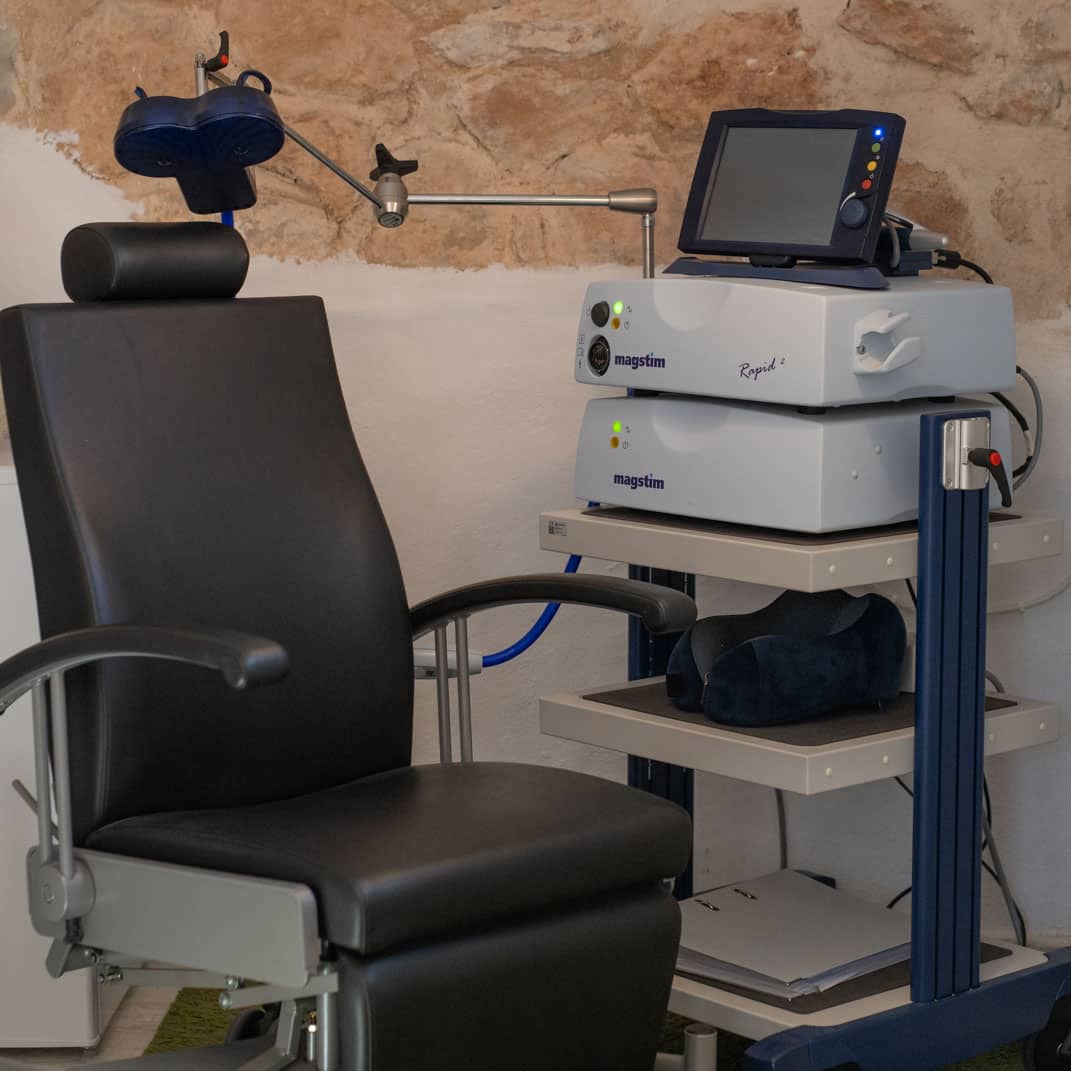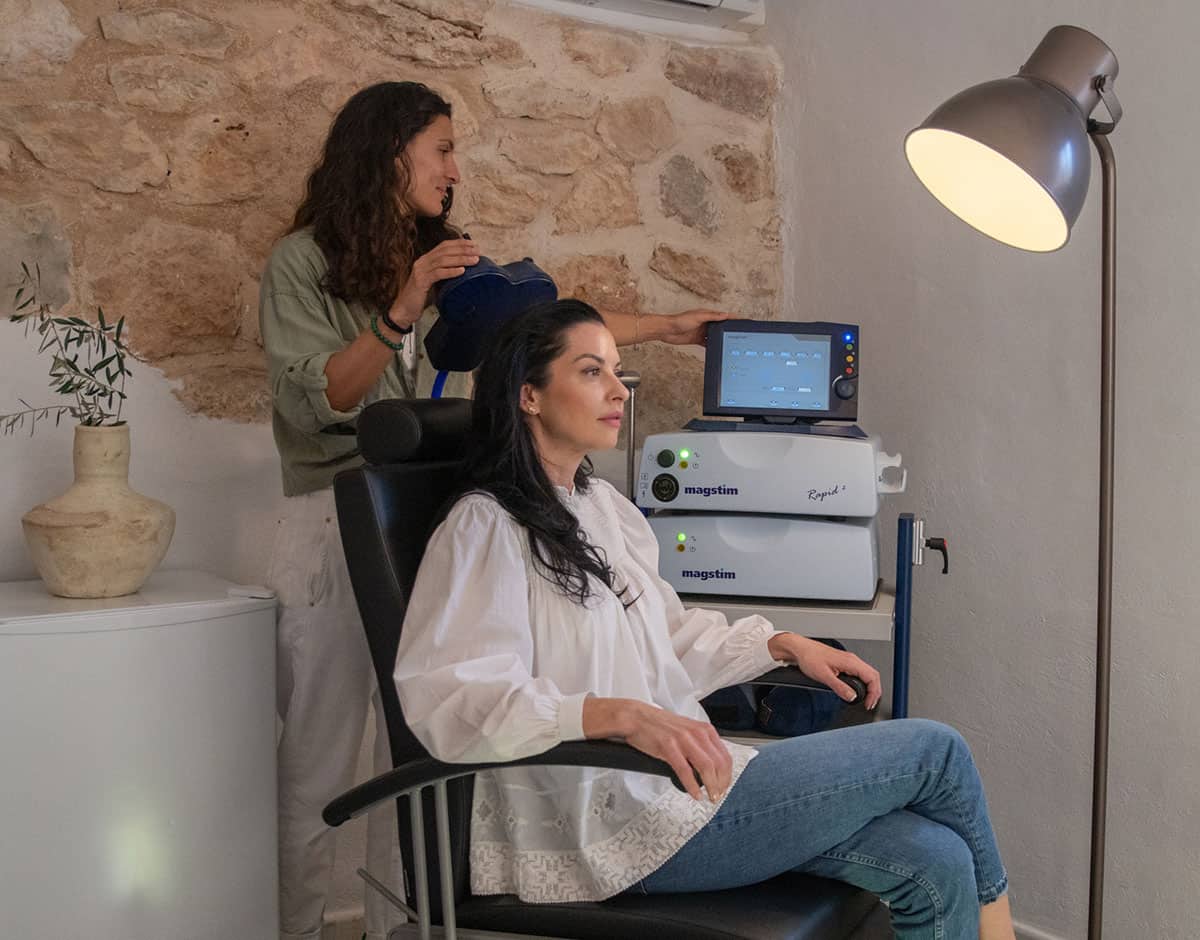TMS Machine
What is transcranial magnetic stimulation (TMS or rTMS)?
Transcranial magnetic stimulation (TMS) is a form of neuromodulation. A non-invasive, non-convulsive method of brain stimulation therapy that has proved effective in the treatment of neurological and mental health conditions such as depression and general anxiety disorder.
Request a callback!

How does TMS work?
TMS uses a magnetic field to deliver a short-lasting electrical pulse into the brain where it stimulates neurons (nerve cells). This has been shown to improve communication between different areas of the brain particularly in the superficial regions of the cerebral cortex.
Repetitive transcranial magnetic stimulation (rTMS) is a type of TMS. During the treatment of depression and other neuropsychiatric disorders, the pulses are repeated quickly one after the other, thus gaining the name rTMS. You will find both terms used interchangeably.
What is TMS used for?
Pioneered in 1985, at the University of Sheffield by Anthony Baker a medical physicist, TMS was developed for the diagnosis of depression. Since its introduction it has undergone extensive research and clinical trials and is now known to be successful in the identification and treatment of several other neurological illnesses and psychiatric disorders.
TMS treatments have been approved by NICE (National Institute for Health and Care Excellence, UK) and the FDA (Food and Drug Administration, USA).
TMS is now used in varying degrees to detect and treat the following –
→ Various forms of depression, including major depressive disorder, bipolar, and post-partum depression.
→ Substance dependencies including drugs, alcohol, and nicotine.
→ Obsessive compulsive disorder (OCD).
→ Post-traumatic stress disorder (PTSD).
→ Generalised anxiety disorder.
→ Schizophrenia.
→ Tourette Syndrome.

Benefits of TMS
1. TMS is non-invasive.
TMS is non-invasive, meaning it works outside the body. It does not require surgery or the implantation of electrodes. During a diagnosis session or treatment therapy the TMS machine sends a mild electromagnetic pulse, or wave through the skull into the brain to stimulate targeted areas; specifically, those cells involved in mood regulation which release neurotransmitters like serotonin and dopamine. The waves used are similar to those of a magnetic resonance imaging (MRI) scan, and are completely harmless, and painless.
2. There are no extreme side effects with TMS.
Unlike the typical pharmaceutical treatments used for depression and anxiety disorders, there are no lasting or severe side effects with TMS. Antidepressant medication can come with a wide range of side-effects including nausea, weight gain, tiredness, sleepiness and insomnia, sexual dysfunction, memory loss, and apathy.
TMS is not completely side effect free, but the minimal effects felt by some during the actual stimulation process, which can include a mild headache or dizziness and slight scalp discomfort, are usually brief and will go within minutes of the session concluding.
3. TMS does not require sedation or anaesthesia.
TMS therapy can be done in a rehab clinic or hospital outpatient setting. There are no negative effects and patients do not need to be accompanied as they are able to function normally afterwards and can drive themselves immediately following the session.
4. TMS is not addictive.
Some of the pharmaceutical based treatments for depression and emotional disorders carry the risk of addiction. TMS is totally non-addictive and has in fact has been proven to be effective in treating substance addiction, and other co-occurring conditions such as PTSD and bipolar.
5. TMS is effective and has long term results.
TMS has shown to be up to 70% effective in the treatment of mental health disorders; and the results continue long after the treatment is over with 90% of people feeling the benefits 12 months later. It has also demonstrated positive outcomes in patients who previously did not respond well to the use of antidepressant medication.
Request a callback!
Clinical trials supporting the efficacy of TMS treatment.
There have been several studies and trials into the efficacy of TMS treatment for –
Depression
In a 2012 study, TMS was found to improve depression significantly in 58% of patients and provide complete remission of symptoms in 37% of patients. Studies have found that TMS is particularly effective for treatment-resistant major depressive disorder.
General Anxiety Disorder
A randomised trial by Dieffenbachia in 2016, showed that TMS gave a significantly higher clinical response and remission rates than the placebo group, and sustained after treatment had ended. Results showed 1 in 3 people recovered from anxiety entirely, and 75% saw clinically significant improvements.
Smart TMS (one of the UKs leading TMS providers), found in a patient audit that their remission rates (identifying as no longer clinically regarded and anxious) stand at 62%, with 75% of all patients showing a minimum of a 30% improvement in their symptoms.
Cocaine Addiction
A 2007 trial (by Camprodon) documented that cocaine cravings reduced temporarily after only two TMS sessions. Politi in 2008 continued the research with similar results, both studies demonstrated the vital role the prefrontal cortex plays in modulating cravings felt by patients with addiction.
Further research (2016) used a medicated control group, to be compared with the group receiving TMS treatment. A higher number of cocaine-free urine samples were given in the TMS group, and the average cocaine craving scale score was much lower. Following the completion of the initial trial the medicated control group were switched to TMS treatment, achieving further positive results.
Alcohol
Alcohol use impairs the ability of the nerves of the brain cells in the left prefrontal cortex to build and reconnect, in 2018/19 a study showed proved the benefits of using TMS to rewire the brain in alcohol addiction. Further studies have proved that recently detoxed patients have been able to use TMS to reduce cravings, thus reducing the risk of relapse.
PTSD
Studies in 2014 and 2017 both saw a significant improvement in the main and related symptoms of PTSD following a course of TMS treatment (compared with a placebo group).
A 2018 study revealed that treating PTSD with a combination of TMS and psychological therapy was significantly more effective than therapy alone and the benefits continued beyond the end of the six-month study.
OCD
A review of 20 separate studies concluded that TMS gave clinically significant improvements in symptoms compared to a placebo treatment. Studies showed that, following a full course of OCD treatment, around 55% of patients saw a significant reduction in their symptoms with 1 in 3 going into complete remission.
Request a callback!
What if I want to help a loved one?
CAREFUL AND GENTLE EXPERTS
If family doesn’t intervene, who will? We help families get their loved ones into addiction treatment.

In combination
WITH ONE OF OUR THREE PROGRAMME OPTIONS, TMS WILL HELP GET YOU BACK TO LIVING LIFE.
INDIVIDUAL
CARE
This includes an individual deluxe ensuite room in either the upper or lower house. The morning programme activities are compulsory, but the afternoon activities are optional.
10,000€ per week
FULL BESPOKE
CARE
This includes an individual deluxe ensuite room in either the upper or lower house. All timetable activities are available as optional, plus extra sessions or therapies as required.
15,000€ per week
LUXURY BESPOKE
PROGRAMME
This offers all the treatments services and facilities of the Full Bespoke Programme but also includes exclusive use of “The Casita”.
POA per week
Surrounded by
THE BEAUTIFUL NATURE OF IBIZA
Ibiza is an idyllic spot to recover. The sun shines on average 300 days of the year, it’s surrounded by the pristine, turquoise Mediterranean sea and has beautiful beaches and evergreen pine forests. The island’s sunny, powerful energy and serene surroundings make it a perfect place for an effective and restful residential recovery treatment.

Admission Process
EASY STEPS INTO IBIZA CALM
1 —-Phone call
A family member or a patient calls, we will explain the time frame, suitability, our costs and answer any other questions.
2 —-Admission Assessment
An initial telephone assessment with the client.
3 —-Set a date
We give each client a date for admission and everyone is greeted by our clinical team on arrival.
 Email Us
Email Us Call Us Now:
Call Us Now: 